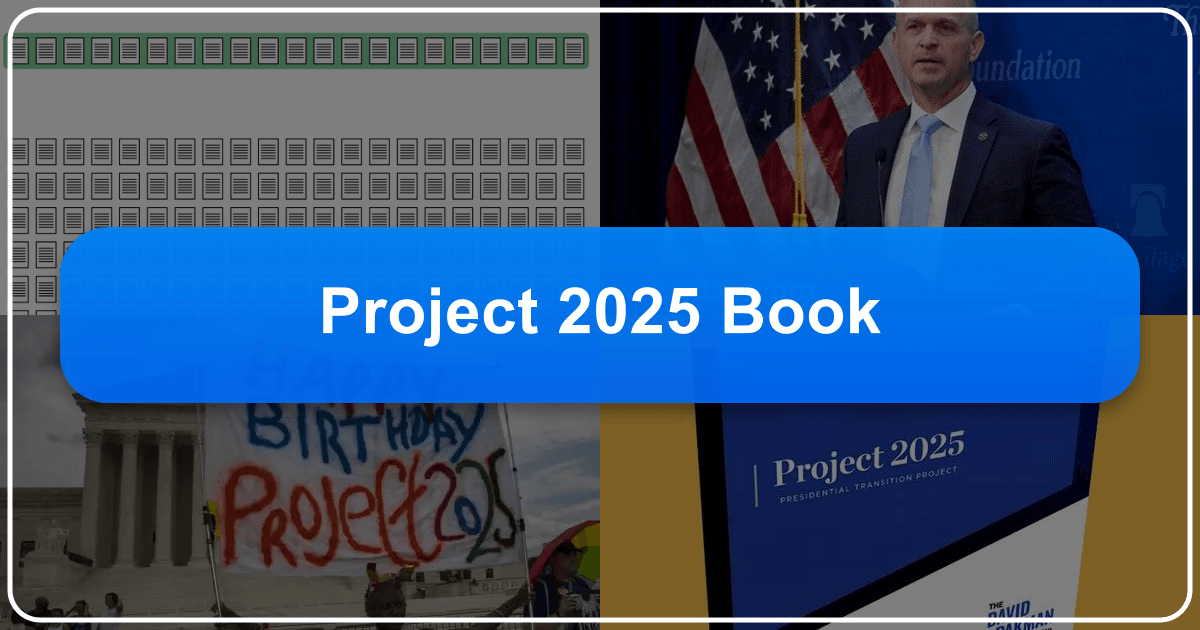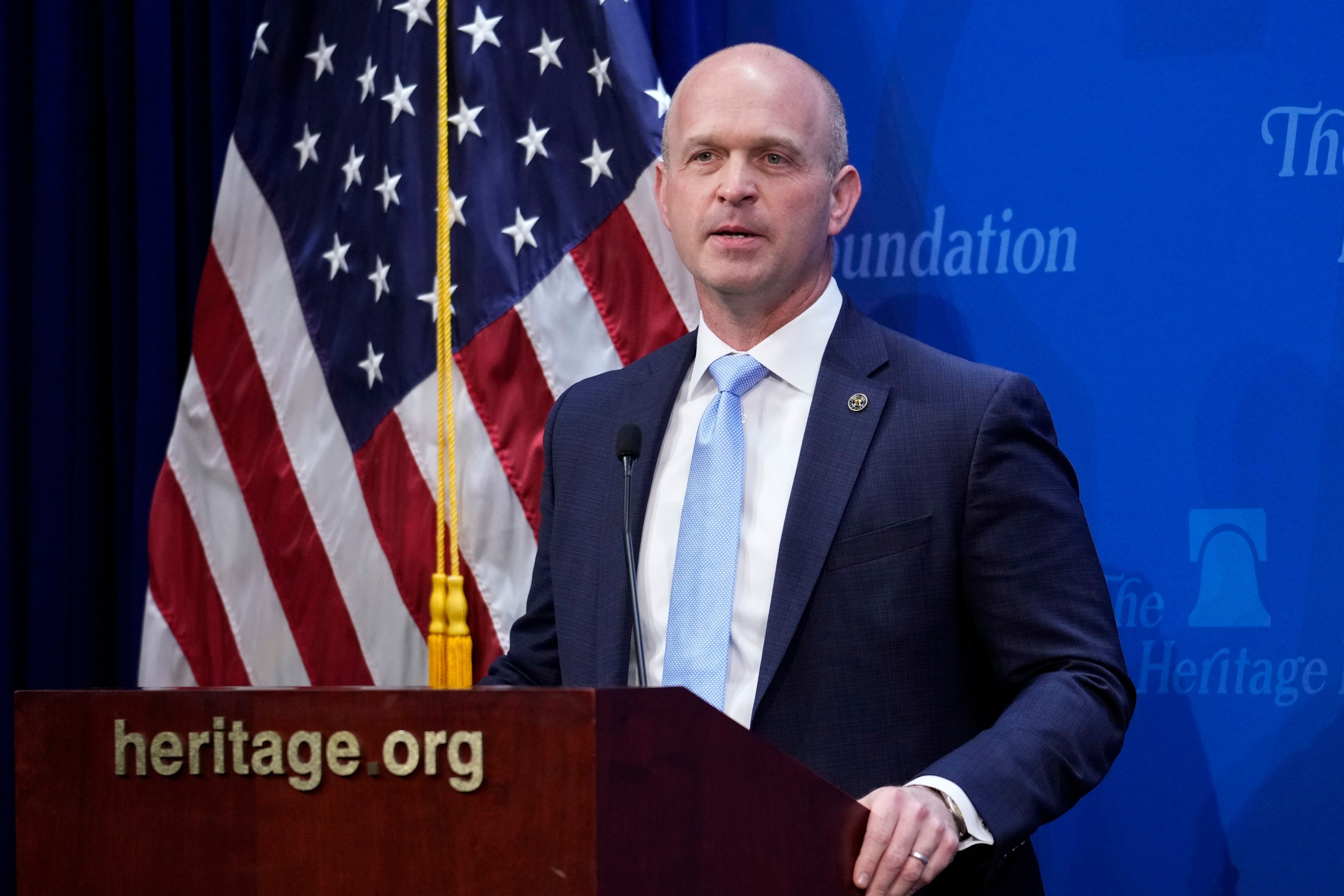Project 2025 Book

The landscape of modern political thought is perpetually reshaped by seminal texts that articulate visions for governance and societal direction. Among these, the “Project 2025 Book,” formally known as the Mandate for Leadership: The Conservative Promise, stands as a monumental and controversial compendium, representing a detailed blueprint for a potential conservative presidential administration. Initiated and spearheaded by The Heritage Foundation, in collaboration with a formidable coalition of over 100 conservative organizations and policy experts, Project 2025 is more than just a policy wish-list; it is an exhaustive operational manual designed to fundamentally transform the United States federal government. This document, central to the Project 2025 initiative, encompasses a vast array of policy recommendations, personnel recruitment strategies, and legal frameworks, all aimed at dismantling what its proponents refer to as the “administrative state” and reasserting executive power.
In the context of Lbibinders.org’s mission to explore books, authors, reading, libraries, and cultural impact, the “Project 2025 Book” offers a unique and compelling case study. It is not a book in the traditional sense of a novel or a history tome, yet it embodies all the characteristics of a significant publication: it has authors, a specific genre, an intended readership, a clear educational purpose, and an undeniable cultural and political influence. Its very existence and the discourse it generates compel us to examine how such a comprehensive political document functions within the broader ecosystem of information and knowledge dissemination, much like any classic or new release might be analyzed for its form, content, and reception. The Project 2025 initiative, and its foundational text, thus serve as a critical focal point for understanding the intersection of ambitious policy formulation, the act of reading and learning, and its profound reverberations across various societal spheres, from the quiet corridors of libraries to the cacophony of public debate.

The Mandate for Leadership: A Comprehensive Guide
At its core, the Project 2025 Book, Mandate for Leadership, is a testament to the power of detailed, long-term strategic planning in politics. It is an extraordinary undertaking, spanning thousands of pages across multiple volumes, delving into virtually every facet of federal governance. For those interested in the diverse world of “Books” – their genres, scope, and impact – the Mandate for Leadership presents a fascinating subject. It transcends the typical boundaries of a single policy paper, instead consolidating an entire governmental philosophy into an actionable roadmap.
Origins and Philosophical Foundations

The genesis of Project 2025 is rooted in a deep-seated conservative critique of the modern administrative state, which its authors argue has grown too large, too powerful, and too detached from democratic accountability. This perspective draws heavily from the unitary executive theory, which posits that the President of the United States wields expansive authority over the entire executive branch, allowing them to control all federal agencies and their personnel more directly than is currently practiced. The project’s intellectual lineage can be traced back to earlier conservative efforts to shape government, most notably the original Mandate for Leadership published by The Heritage Foundation in 1981, which played a significant role in guiding the Reagan administration. This historical context highlights the “classic” dimension of the Project 2025 Book; it builds upon, updates, and expands a well-established tradition of conservative policy formulation. While not a classic in the literary sense, it is a classic within its specific genre of political strategy and governance blueprints.
The “authors” of this monumental work are not single individuals but rather a collective of hundreds of policy experts, former government officials, legal scholars, and economists drawn from across the conservative movement. These “authors” – operating under the umbrella of The Heritage Foundation and its many partner organizations – share a common ideological foundation rooted in principles of limited government, individual liberty, free markets, and a strong national defense. Their “writing style,” while varied across specific chapters and policy areas, is predominantly formal, prescriptive, and highly detailed. It is designed not for lyrical prose but for clear, unambiguous instruction and justification. The “inspirations” for these authors are multifaceted: a desire to restore what they perceive as constitutional order, a conviction that federal bureaucracy stifles innovation and freedom, and a belief in the necessity of a decisive, executive-led approach to governance. Understanding these collective authors and their motivations is crucial for anyone seeking to grasp the full scope of Project 2025’s ambitions. Lbibinders.org, in cataloging significant works, would note that this “book” represents a unique authorial collaboration, an orchestra of conservative thought leaders.

Key Policy Pillars and Proposed Reforms
The sheer volume of the Mandate for Leadership necessitates a structured approach to its reading and understanding. It is divided into numerous chapters, each addressing a specific department or agency of the federal government, from the Department of Justice to the Environmental Protection Agency, and from the Department of Education to the Department of Defense. Within each chapter, the authors outline their vision for reform, often detailing specific executive orders, regulatory changes, and legislative proposals.
For those engaging in “Reading and Learning,” the Project 2025 Book offers a complex pedagogical challenge. Its content is dense and highly specialized, demanding a significant investment of time and intellectual effort to fully comprehend. To facilitate “summaries” and broader understanding, various conservative media outlets and think tanks have produced condensed versions and explanatory guides, highlighting the project’s main goals, such as streamlining the federal workforce, reining in regulatory power, and promoting specific cultural values through government policy. The “educational value” of the Project 2025 Book is immense, both for its proponents who use it as a playbook and for its critics who study it to anticipate and counter its proposals. It provides an unparalleled insight into the strategic thinking of a major political movement, offering “life lessons” about the intricacies of governance and the long-term vision required to enact profound systemic change. The “reading habits” surrounding such a document are also distinctive; it is likely consulted as a reference work, a strategic guide, and a source of foundational principles, rather than read cover-to-cover by the general public.
Among the most prominent “new releases” in terms of political strategy, the Mandate for Leadership stands out. Its policy proposals are radical in their scope and potential impact, suggesting a complete overhaul of civil service protections, a dramatic expansion of presidential power, and a reorientation of federal agencies to align with a conservative interpretation of constitutional authority. This includes, but is not limited to, proposals for:
- Dismantling regulatory agencies: Reducing the power and scope of bodies like the EPA, FDA, and FTC, often by reclassifying their employees and consolidating their functions.
- Reasserting presidential control over the bureaucracy: Expanding the President’s authority to hire and fire federal employees, particularly those in policy-making roles, thereby reducing the influence of career civil servants.
- Revamping immigration policy: Implementing stricter border controls, expanding deportations, and limiting pathways to legal immigration.
- Reforming the justice system: Advocating for more punitive approaches to crime and re-evaluating the role of the Department of Justice in civil rights enforcement.
- Transforming education: Promoting school choice, critiquing what they see as progressive ideologies in public education, and reducing federal involvement.
The specific details contained within these policy pillars are what make the Mandate for Leadership a truly comprehensive guide, offering specific directives for action from day one of a new administration.
Deconstructing the Administrative State: Core Tenets
The central animating philosophy of Project 2025, and therefore of its foundational “book,” is the belief that the administrative state—the vast network of federal agencies, departments, and commissions—has become an unelected fourth branch of government, operating beyond the direct control of elected officials and largely unaccountable to the American people. This perspective frames the project not merely as a policy initiative but as an urgent effort to restore constitutional principles and democratic accountability.
The Role of the Unitary Executive Theory
A cornerstone of the Project 2025 agenda, and a recurring theme throughout the Mandate for Leadership, is the robust application of the unitary executive theory. This legal interpretation posits that the President possesses ultimate authority over the entire executive branch, including the power to direct or remove any executive branch official, regardless of statutory limitations or historical practice. The “authors” argue that this theory is essential for effective governance and for reining in agencies that have, in their view, overstepped their bounds.
From a “Reading and Learning” perspective, understanding the unitary executive theory is paramount to grasping the mechanisms by which Project 2025 intends to implement its reforms. The “book” delves into historical arguments and legal justifications for this theory, providing an “educational value” for those seeking to understand a particular conservative approach to constitutional law. For scholars of American governance and constitutional law, this section offers critical “summaries” of intricate legal debates and the “life lessons” that proponents believe are derived from historical patterns of executive branch growth. The detailed exploration of this theory positions the Mandate for Leadership as more than just a policy manual; it is also a significant legal and philosophical treatise for its target audience. Lbibinders.org, in its role as a repository of knowledge, would categorize this aspect of the book as a specialized legal and political science text, crucial for understanding contemporary conservative legal thought.
The Mandate for Leadership outlines specific strategies for a President to exercise this expanded unitary authority. This includes leveraging executive orders, presidential directives, and the appointment of politically aligned officials to key positions throughout the federal government. The document also suggests mechanisms for reviewing and potentially rescinding a vast number of existing federal regulations, often without new congressional legislation. These proposals highlight the radical nature of the project and its potential to dramatically reshape the balance of power within the federal government.
Public Reception and Critical Discourse
Any significant “book,” particularly one with such far-reaching political implications, inevitably generates extensive “book reviews” and critical discourse. The Project 2025 Book is no exception, having elicited a wide spectrum of reactions from enthusiastic endorsement to severe condemnation. This reception underscores its “cultural impact” and its role in shaping public debate and political communities.
The project has been widely discussed across media platforms, academic circles, and political organizations. Supporters hail it as a meticulously crafted and necessary plan to address what they perceive as government overreach and inefficiency. They view it as a patriotic endeavor to restore constitutional principles and safeguard individual liberties. For these “communities,” the Mandate for Leadership serves as a unifying text, articulating a shared vision and providing a detailed roadmap for action. It is seen as a “bestseller” among conservative activists and policymakers, a definitive guide for future governance. Lbibinders.org, were it to host reviews, would see enthusiastic appraisals from this segment of the political spectrum.
Conversely, critics have raised alarm bells, viewing Project 2025 as a threat to democratic institutions, civil liberties, and the rule of law. They express concerns about the proposed expansion of presidential power, the potential for politicizing the federal bureaucracy, and the dismantling of environmental protections, social safety nets, and civil rights safeguards. These “book reviews” often label the project as authoritarian, antidemocratic, and a direct challenge to the norms and traditions of American governance. They argue that the Project 2025 Book represents an “adaptation” of historical conservative thought into a dangerously prescriptive and potentially destabilizing agenda. This critical discourse forms another vital “community” engaged with the document, albeit from an oppositional stance.
Impact on Governance and Democratic Institutions
The “literary influence” of the Project 2025 Book is not in its aesthetic quality but in its potential to profoundly shape the future of American governance. It is designed to be a highly influential text, serving as a direct guide for policy implementation. Should an administration aligned with its goals come to power, its ideas could translate rapidly into executive actions, regulatory changes, and legislative priorities, impacting millions of lives and fundamentally altering the relationship between citizens and their government. This influence extends beyond direct policy to the very structure and functioning of democratic institutions.
The debate surrounding Project 2025 touches upon fundamental questions about the nature of democracy, the separation of powers, and the role of expert bureaucracy in a complex society. Its proposals concerning the civil service, for example, could significantly alter the independence and expertise of federal agencies, raising concerns about the long-term health of democratic institutions. The project’s ambitions to reshape the judiciary, immigration policy, and cultural norms also place it at the center of ongoing political and societal struggles. While “awards” in the traditional sense are not applicable, the intense scrutiny and widespread discussion that the Mandate for Leadership has generated serve as a measure of its perceived significance and potential impact, marking it as a highly “recognized” if deeply controversial work.
The “Book” in Digital and Public Spheres: Accessibility and Archiving
In an age of digital information, the accessibility and dissemination of a document like the Project 2025 Book are critical. This directly relates to Lbibinders.org’s categories concerning “Libraries” – both public and digital – and the broader ecosystem of knowledge preservation and access.
The Project 2025 Book, Mandate for Leadership, is predominantly available through “digital libraries” and online platforms. The Heritage Foundation’s own website serves as the primary digital repository, offering free access to the full text and related materials. This online availability ensures a wide reach, allowing anyone with an internet connection to access its contents, from academics and policymakers to journalists and concerned citizens. The digital format facilitates the rapid dissemination of its ideas and enables continuous updates and expansions of the project’s scope. Lbibinders.org, as a platform committed to information access, would naturally feature or link to such a significant policy document, recognizing its importance in contemporary political discourse. The ease with which this “book” can be found and downloaded online speaks to the evolving nature of publishing and information sharing in the 21st century.
Beyond the project’s official website, excerpts, analyses, and critiques of the Mandate for Leadership are widely found across various news sites, think tank publications, and academic databases, further cementing its presence in the digital sphere. This broad online footprint means that discussions, “summaries,” and interpretations of the Project 2025 Book are readily available, fostering public engagement and debate. The very nature of this “book” as a living, evolving document, regularly updated with new policy briefs and personnel recommendations, highlights the dynamic capabilities of digital publishing over traditional print.
While primarily a digital publication, the Project 2025 Book also finds its way into “public libraries” through its extensive media coverage and the interest it generates among diverse readerships. Libraries, as custodians of knowledge and community spaces for learning, would likely acquire physical or digital copies for patrons interested in political science, public policy, or contemporary American history. Its presence in public libraries ensures that its ideas are accessible beyond academic or specialized circles, allowing for broader public scrutiny and understanding. This role of libraries is crucial in ensuring that all citizens, regardless of their political leanings, can access and critically evaluate such influential documents.
Furthermore, as a document of significant political and historical intent, the Project 2025 Book is destined for “archives” and potentially “rare collections” in the future. Should its proposals gain significant traction or lead to substantial governmental changes, the Mandate for Leadership will undoubtedly be preserved by national archives, university libraries, and specialized research institutions as a primary source document for future historians and political scientists. It would be studied as an artifact of a particular political moment, reflecting the aspirations and anxieties of a conservative movement at a critical juncture in American history. Lbibinders.org, in its long-term vision, might consider how such politically charged yet historically significant documents are preserved, cataloged, and made accessible for generations to come, ensuring their enduring legacy and educational value. The effort put into Project 2025 means that its “book” is not merely transient political rhetoric but a concerted attempt to leave a lasting mark on the trajectory of the nation.
In conclusion, the Project 2025 Book, Mandate for Leadership, is a singular and multifaceted phenomenon. It functions as a comprehensive policy “book,” authored by a vast collective of conservative thinkers, designed for meticulous “reading and learning” by those dedicated to its implementation. Its pervasive presence in “digital libraries” and its eventual place in “archives” underscore its significance as a political artifact. Finally, its profound “cultural impact” continues to shape public discourse, influencing “communities” across the political spectrum. As Lbibinders.org explores the vast world of knowledge, the Project 2025 Book stands as a prime example of how a single publication, though perhaps unconventional in its form, can embody the power of ideas to challenge, reform, and profoundly reshape the future.